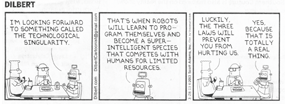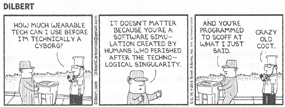Syllabus
Download and print [pdf]
AST 321 The Future of Humanity
Fall 2015 (Unique Number 46755)
| TIME, PLACE: | MWF 1:00-1:50 PM, RLM 15.216B | ||||||
| INSTRUCTOR: |
J. Craig Wheeler - a theoretical astrophysicist specializing in exploding stars and
related topics.
|
TEACHING ASSISTANT: Sydney Sherman
GRADES: Three formal writing assignments of about 25 pages total will constitute 75% of the grade. This course has a Substantial Writing Component Flag. The remaining 25% will be based on class participation in discussion and content development.
COURSE DESCRIPTION: We will explore the possibilities for the future of humanity in an astronomical context: life on a pale blue dot within a vast Universe and a vast expanse of time. We will cover elements of cosmology and astronomy for context, the basics of biological evolution, including human evolution, and consider the current state of humanity. We will then try to extrapolate into the future in terms of natural and self-driven evolution, the digital revolution, nanotechnology, the promise and challenges of space travel, and related topics, all in the context of the great sweep of time before us, 10,000 years, a million years, a billion years.
PAPERS: All papers will be formatted as typed, double-spaced, on standard 8.5x11 paper and submitted electronically. They will be checked for plagiarism.
Paper 1, 5 pages, Evolution, drawing, at least, on Darwin and Dawkins, Due Friday, September 11.
Paper 2, 10 pages, Topic of Choice, Due Friday, October 16.
Paper 3, 10 pages, The Future of Humanity, Due Friday, December 4.
CLASS DISCUSSION: Mandatory components – I will call on individuals and expect them to respond with a summary of readings, opinions of those readings, and connections to other aspects of the course topics; peer review of draft papers. Voluntary component – participation in class discussion, contribution of links, readings.
TEXT: The required text is The Singularity is Near: When Humans Transcend Biology (Penguin) by Ray Kurzweil. We will also draw on Darwin, The Origin of Species and Descent of Man (available as free ebooks and from the UT library system), The Selfish Gene by Richard Dawkins (available electronically from the UT library system) and Who Owns the Future? (Simon & Schuster) by Jaron Lanier. Extensive use will also be made of online and other material.
Facebook: AST309N (voluntary, group account, by invitation) – use the Facebook account to complement class discussion, post relevant links.
Twitter: follow @ast309 (optional) - I post irregularly on the daily life of an astronomy professor.
WEB SITE: https://www.as.utexas.edu/astronomy/
Writing Flag
This course carries the Writing Flag. Writing Flag courses are designed to give students experience with writing in an academic discipline. In this class, you can expect to write regularly during the semester, complete substantial writing projects, and receive feedback from your instructor to help you improve your writing. You will also have the opportunity to revise one or more assignments, and you will be asked to read and discuss your peers’ work. You should therefore expect a substantial portion of your grade to come from your written work. Writing Flag classes meet the Core Communications objectives of Critical Thinking, Communication, Teamwork, and Personal Responsibility, established by the Texas Higher Education Coordinating Board.
Students with Disabilities
Students with disabilities may request appropriate academic accommodations from the Division of Diversity and Community Engagement, Services for Students with Disabilities, 471-6259.
Academic Integrity and the University Code of Conduct
A fundamental principle for any educational institution, academic integrity is highly valued and seriously regarded at The University of Texas at Austin. More specifically, you and other students are expected to maintain absolute integrity and a high standard of individual honor in scholastic work undertaken at the University.
The University Honor Code states: "The core values of the University of Texas at Austin are learning, discovery, freedom, leadership, individual opportunity, and responsibility. Each member of the University is expected to uphold these values through integrity, honesty, trust, fairness, and respect toward peers and community."
Academic dishonesty includes: cheating, plagiarism, unauthorized collaboration, falsifying academic records, misrepresenting facts, multiple submissions, and any other acts or attempted acts that violate the basic standard of academic integrity.
Consequences of academic dishonesty can be severe. Grade-related penalties are routinely assessed but students can also be suspended or even permanently expelled from the University for scholastic dishonesty. Other potential consequences can be particularly far-reaching, such as the creation of a disciplinary record that may very well impact future opportunities. Furthermore, incidents of scholastic dishonesty diminish the overall value of scholastic achievements on this campus and reflect poorly on the University.
Helpful resources:
Office of the Dean of Students: deanofstudents.utexas.edu/
Guide to Avoiding Plagiarism: www.utexas.edu/cola/centers/cwgs/_files/pdf-4/ai2012.pdf
Accommodations for Religious Holidays
By UT Austin policy, you must notify the professor of a pending absence at least fourteen days prior to the date of observance of a religious holy day. If you must miss a class, an examination, a work assignment, or a project in order to observe a religious holy day, you will be given an opportunity to complete the missed work within a reasonable time after the absence.
Emergency Procedures
In the event of an evacuation, follow the instruction of faculty or class instructors. Occupants of buildings on The University of Texas at Austin campus are required to evacuate buildings when a fire alarm is activated. Students requiring assistance in evacuation should inform their instructor in writing during the first week of class. Familiarize yourself with all exit doors of each classroom and building you may occupy and remember that the nearest exit door may not be the one you used when entering the building. Do not re-enter a building unless given instructions by the following: Austin Fire Department, The University of Texas at Austin Police Department, or Fire Prevention Services office.
Link to information regarding emergency evacuation routes and emergency procedures (including weather closures) can be found at: www.utexas.edu/emergency For more information, contact the Office of Campus Safety and Security at 512-471-5767 or www.utexas.edu/safety/
Behavior Concerns Advice Line (BCAL)
The Behavior Concerns Advice Line is a service that provides The University of Texas at Austin’s faculty, students and staff an opportunity to discuss their concerns about another individual’s behavior. This service is a partnership among the Office of the Dean of Students, the Counseling and Mental Health Center (CMHC), the Employee Assistance Program (EAP) and The University of Texas Police Department (UTPD). An individual can either call the line 512-232-5050 or report online at www.utexas.edu/safety/bcal/

26 August 2015
CNS Help Request · web accessibility policy · web privacy policy



